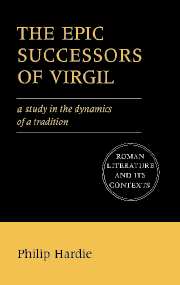3 - Heaven and Hell
Published online by Cambridge University Press: 05 June 2012
Summary
Virgil transforms the epic's traditional concern with power and the wielders of power by making the stage for the struggle for power nothing less than the universe itself. In doing this he was exactly in tune with the ideological consciousness of the Romans, and was a determining voice in the crystallization of that consciousness. The idea that Rome was destined to be the ruler of the world had begun with an awareness of the significance of the Second Punic War; it had then fuelled the competing claims to power of the warring dynasts of the late Republic, to become the inheritance of the sole princeps, who could shield himself against the danger of the renewed division and disintegration of the state only through the fiction that in his one person, unus, he embodied the whole, omnes or omnia.
Virgil's canny identification of the Roman centre of the epic ensured that the genre had a vigorous after-life; through the transposition of the theme of universal power from the terrestrial to the celestial plane the Virgilian epic easily became the Christian epic. The Biblical story, as told for example in the epics of Vida and Milton, has as its plot-line ‘the world destroyed and world restored’, in which the Incarnation makes of the universal god a man who is also all men, another scapegoat who takes the sins of the world upon his head. The Christian epic tells of a universal struggle of a particular sort, that between the forces of Heaven and Hell.
- Type
- Chapter
- Information
- The Epic Successors of VirgilA Study in the Dynamics of a Tradition, pp. 57 - 87Publisher: Cambridge University PressPrint publication year: 1992

